
Main Page
Alphabetical Menu
Chronological Menu
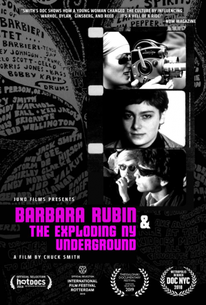
Barbara Rubin & the Exploding NY Underground is well-edited and illuminating documentary biopic about a filmmaker, Barbara Rubin, who made experimental and avant-garde films during the 1960s in New York. One of those films, Christmas on Earth was controversial because of how sexuality explicit it was and, like most cult classics, it was also quite divisive. She worked with other talented filmmakers who were part of the Underground film movement, namely, Andy Warhol and Jonas Mekas. Director Chuck Smith blends archival footage with contemporary interviews with film scholars such as the very knowledgeable film critic Amy Taubin. You'll also get to see scenes from Rubin's experimental films which were among the first to use multimedia in her films which is also used by filmmakers to this very day. To be fair, this doc doesn't really transcend its subject like truly great docs do, i.e. the upcoming Pavarotti, but it's nonetheless a worthy introduction to a lesser-known filmmaker. Although you don't have to be a film aficionado to appreciate this doc, it would certainly help. It's a must see for film buffs and would make for a great double feature with the recent documentary biopic Be Natural: The Untold Story of Alice Guy-Blanché. Juno films opens Barbara Rubin & the Exploding NY Underground at IFC Center. Aladdin 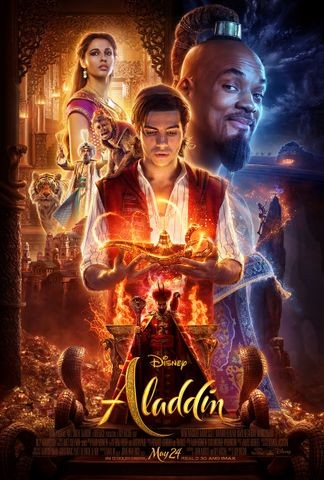 Aladdin (Mena Massoud), a street urchin, meets Princess Jasmine (Naomi Scott) at a marketplace in the kingdom of Agrabah. He soon enters a cave with treasure where he finds a magic lamp with a Genie (Will Smith) who grants him only three wishes. One of those wishes is to transform him into a prince to try to win Princess Jasmine over. The only person standing in his way is Jafar (Marwan Kenzari) who also wants to posses the magic lamp, the film's MaGuffin. Aladdin, the live-action remake of the animated classic, brims with colorful, lavish set and costume design along with mostly exhilarating musical numbers, but the story beyond the music falls flat because it fails to pack an emotional punch and often becomes dull. On a positive note, the actors' beards look real, and Massoud and Scott are both charismatic actors. However, their acting chops are not quite as strong as their singing talents, so during the beats don't quite land during the more dramatic and romantic scenes with them. The scenes that do work other than the musical numbers are the ones with the Genie and Aladdin bantering with each other, especially when Aladdin introduces himself to the Sultan (Navid Negahban) while disguised as a prince. Their dialogue is quite funny and witty at times. Kids will find Aladdin's pet monkey, Abu, amusing. Also, Nasim Pedrad gives the film's most radiant, warm and memorable performance as Dalia, Princess Jasmine's housemaid. Her scenes are ephemeral, though. If only there were more witty banter because Aladdin is most entertaining when it doesn't try to take itself so seriously. Director/co-writer Guy Ritchie overstuffs the Aladdin with so much CGI that he neglects to incorporate a far more special effect into the film: humanism. At 2 hours and 8 minutes, it feels overlong and overproduced while the plot just seem to be going through the motions without transcending like the animated classic. To be fair, the musical numbers do somewhat enliven the film, especially the scene with "A Whole New World," but it's not enough to make the film truly soar. Overall, it's not a cringe-inducing remake; it just pales compared to the animated Disney classic. At least this remake will make you appreciate the many strengths of that version a lot more.
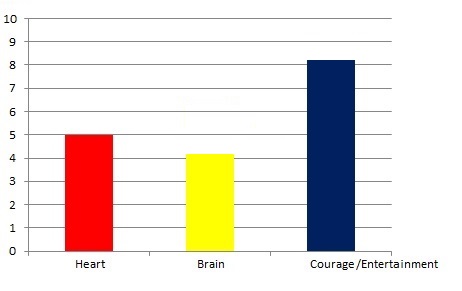 Booksmart 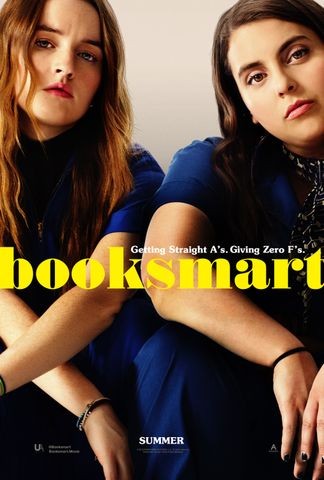 Amy (Kaitlyn Dever) and Molly (Beanie Feldstein), her best friend, are high school seniors about to graduate and go off to college. They're straight-A students who've been hitting the books more than partying. On the day before graduation, Molly learns that her classmates who are party animals, such as Triple A (Molly Gordon), aren't quite as dumb as she thought they were. She convinces Amy that they should spend the night partying. Everyone else parties, so why shouldn't they also be allowed to party? Lisa Kudrow and Will Forte play Amy's parents, Jason Sudeikis shows up as the high school principal who moonlights as a cab driver, Skyler Gisondo plays Jared, a classmate who has a crush on Molly, and Diana Silvers plays Amy's romantic interest, Hope (gee, I wonder why the screenwriters chose to give her that name!). Booksmart is a teen dramedy that lacks the razor-sharp wit, intelligence and delicate blend of comedy, drama and satire found in coming-of-age films like Mean Girls, Fast Times at Ridgemont High, Ghost World, Clueless, Heathers, The Breakfast Club and many more that have managed to transcend their own genre to become timeless classics or cult classics. Director Olivia Wilde and the screenwriters, Susanna Fogel, Emily Halpern, Sarah Haskins and Katie Silberman, neglect to achieve an essential element that leads to a systemic problem: they don't provide enough of a window into the heart, mind and soul of any of its characters to allow them to be palpable human beings. They spend too much of their time either searching for a party to go to or getting high or drunk during a party which quickly becomes tedious and doesn't provide new insights about neither Amy nor Molly. The fact that you don't get to meet Molly's parents shows that Booksmart doesn't even try to get to know its protagonists on a human level, although that would've been forgivable if it had humanized Molly in other ways. Ghost World, for instance, didn't introduce you to Rebecca's parents, but that didn't stop the film from being profound character study of both Enid and Rebecca. On top of that, Booksmart's third act suddenly tries to be poignant and uplifting as though Booksmart were a John Hughes movie, but, unlike Hughes' classics, it doesn't come close to earning its uplift. The supporting characters, Triple A, Jared and Hope, are actually far more compelling than Molly and Amy. However, even they are too over-the-top to be taken seriously. Kaitlyn Dever and Beanie Feldstein are pretty good, charismatic actor who deserve much better material.
If Booksmart's screenplay had smarter humor that didn't seem like it were trying too hard to be funny, perhaps it could've at least worked as a comedy. Instead, it goes for witless, lowbrow humor. Amy and Molly try to start a new trend a la "fetch" in Mean Girls by saying "Malala" to each other every now and then as a code word, but that's neither funny nor clever no matter how many times the same joke is repeated. Bridesmaids played pooping into a sink for laughs, Girls Trip tried the same for peeing onto a crowd, and Superbad tried the same for spraying someone with period blood. Now Booksmart comes along and wants you to laugh at someone being vomited on. Thus ends the painfully unfunny series of Comedies With Bodily Fluid. Ah, Bartleby! Ah, humanity!
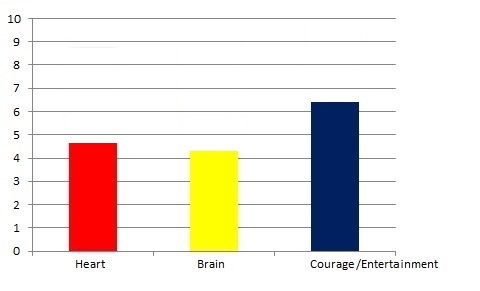 Main Page Alphabetical Menu Chronological Menu ______________________________________________________ |
The NYC Movie Guru
themovieguru101@yahoo.com
Privacy Policy